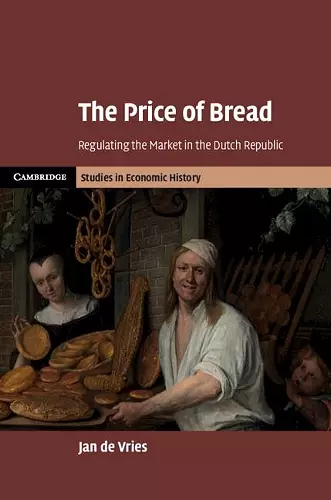The Price of Bread
Regulating the Market in the Dutch Republic
Format:Hardback
Publisher:Cambridge University Press
Published:25th Apr '19
Should be back in stock very soon

The humble loaf serves as a prism through which to study how public market regulation affected private economic life.
How to maintain fair market relations, a major contemporary concern, is addressed in this study of the regulation of bread prices. The humble loaf serves as a prism through which to explore major developments in early modern European society and how public market regulation affected private economic life.A prime contemporary concern - how to maintain fair market relations - is addressed through this study of the regulation of bread prices. This was the single most important economic reality of Europe's daily life in the early modern period. Jan de Vries uses the Dutch Republic as a case study of how the market functioned and how the regulatory system evolved and acted. The ways in which consumer behaviour adapted to these structures, and the state interacted with producers and consumers in the pursuit of its own interests, had major implications for the measurement of living standards in this period. The long-term consequences of the Dutch state's interventions reveal how capitalist economies, far from being the outcome of unfettered market economics, are inextricably linked with regulatory fiscal regimes. The humble loaf serves as a prism through which to explore major developments in early modern European society and how public market regulation affected private economic life.
'Like Galileo's telescope, The Price of Bread lets us see and understand a distant world - early modern Europe and especially the Dutch Republic. We learn what consumers ate, how standards of living changed, and why, in the capitalist Netherlands, taxation and market regulation took a fascinating and strikingly different turn.' Philip T. Hoffman, author of Why Did Europe Conquer the World?
'This intriguing masterpiece explores the municipal system of Broodzetting introduced in the Netherlands in the 1590s that led to high bread prices in both good times and bad. How did they get away with it? Why did the poor not starve? Jan de Vries finds the answers in the precocious commercialisation and growth of the early modern Dutch economy.' Cormac Ó Gráda, author of Famine: A Short History and co-editor (with Guido Alfani) of Famine in European History
'The Price of Bread is Jan de Vries at his best. By analyzing the price of bread, he uncovers deep underlying institutional structures that characterize the Dutch Republic and had important consequences for the country's development. His analysis sheds new light on political economy, consumption patterns and real incomes, and famines.' Jan Luiten van Zanden, author of The Origins of Globalization
'With The Price of Bread, Jan de Vries offers us new insight into the pre-industrial Dutch economy through the prism of one sector. The book is rich in analysis and has ramifications that extend far beyond the regulation of bread prices. A must-read for anyone interested in institutional economies, standards of living, consumption, fiscal policies and state formation, and moral economies.' Bruno Blondé, co-editor of City and Society in the Low Countries
ISBN: 9781108476386
Dimensions: 235mm x 160mm x 30mm
Weight: 1000g
534 pages